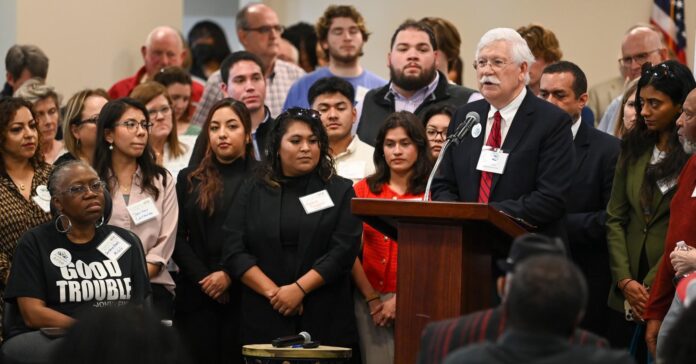Alabama should save lives, create jobs and boost workforce participation by closing the state’s Medicaid coverage gap, Alabama Arise Action members told lawmakers Tuesday.
More than 230 Arise supporters from across Alabama gathered Tuesday at the State House in Montgomery to urge Gov. Kay Ivey and legislators to make this investment in a healthier Alabama. Expanding Medicaid to cover adults with low incomes would ensure health coverage for nearly 300,000 Alabamians who are uninsured or struggling to afford coverage.
Representatives from March of Dimes Alabama, the Alabama Rural Health Association and Arise’s Cover Alabama campaign joined Arise members to make the case for closing the health coverage gap. Alabama Arise Action board president Clyde Jones spoke passionately about the benefits of Medicaid expansion.
“We believe that everyone in our state should be able to get medical care they need to be able to survive and thrive. We’re here today to tell our lawmakers that it’s time to close Alabama’s Medicaid coverage gap once and for all,” Jones said.
“This is an investment in Alabama’s future. It would create thousands of jobs and generate billions of dollars of economic activity. It would help rural hospitals stay open to serve everyone in their communities. And the most important thing it would do: It would save lives.”
The news conference was part of Arise’s annual Legislative Day. Photos from the event are available here. A video of the news conference is available here.
Closing the coverage gap is vital for rural Alabama
Alabama is one of only 10 states yet to expand Medicaid to cover adults with low incomes. And the state’s Medicaid eligibility limit is one of the nation’s lowest. A parent in a three-person household who earns just $5,000 a year makes too much to qualify for Alabama Medicaid.
Closing this coverage gap would strengthen workforce participation and boost local economies across Alabama, studies show. It also would help the state’s rural hospitals remain open to serve everyone in their communities, Alabama Rural Health Association president Farrell Turner said Tuesday.
“When a hospital shuts down, it’s not just health care that’s lost. It’s other health services such as pharmacies and lost jobs. It’s access to essential services, and it’s a blow to the very fabric of our communities,” Turner said. “By closing the coverage gap, we can reduce the burden of unpaid costs on health care providers and reinforce their ability to serve our communities.”
Nineteen of Alabama’s 52 rural hospitals are at immediate risk of closure, according to the Center for Healthcare Quality and Payment Reform. The harmful fallout from those closures would extend far beyond the hospital walls, Turner said.
Hospital closures erode a community’s quality of life and limit its prospects for economic growth, Turner said. He urged lawmakers to act quickly to save people across Alabama from facing that fate.
“We cannot afford to wait until it’s too late. Every day that passes without action puts more hospitals at risk and threatens the health and well-being of rural Alabamians,” Turner said. “Our hospitals, health centers and rural health clinics are at risk. Our communities are in crisis, and the time for action is now. Together, let’s work to close the coverage gap and secure a healthier future for rural Alabama.”
Continuous coverage would save lives of parents and infants
Medicaid expansion also would improve health for parents and children across the state. This is a vital need for Alabama, which has the nation’s worst maternal death rate.
Honour Hill, director of March of Dimes’ maternal and infant health initiatives in Alabama, said Tuesday that closing the coverage gap for all adults with low incomes is an essential step to save lives.
“The health of mom and baby are intrinsically intertwined, and addressing chronic conditions before a woman becomes pregnant is critical,” Hill said. “In Alabama, women of childbearing age need coverage before and between pregnancies, in addition to prenatal and postpartum coverage.”
Lawmakers in 2022 sought to reduce Alabama’s maternal death rate by extending postpartum Medicaid coverage to a full year after childbirth, up from the previous 60 days. Policymakers should build on that progress by ensuring Alabamians with low incomes can continue to receive care without an interruption due to loss of health coverage, Hill said.
“Lack of care before pregnancy can lead to poor pregnancy outcomes,” she said. “Our state is paying much more money to address women’s health issues during or between pregnancies than it would be if lawmakers enacted a policy to close the coverage gap.”
An investment in greater workforce participation
For hundreds of thousands of Alabamians, the health coverage gap is not an abstraction but a reality of everyday life. Alabama Arise’s Cover Alabama campaign director Debbie Smith spoke Tuesday about the difficult decisions that many families must make because Alabama’s refusal to expand Medicaid has left them with no option for affordable health insurance.
“People are facing unimaginable challenges because they lack access to health care,” Smith said. “Families are forced to make impossible choices between putting food on the table and seeking medical treatment. Individuals are delaying necessary care until it’s too late, all because they can’t afford it.”
Cover Alabama is a nonpartisan alliance of more than 130 advocacy groups, businesses, community organizations, consumer groups, health care providers and religious congregations advocating for Alabama to provide quality, affordable health coverage to its residents and implement a sustainable health care system.
Smith highlighted how closing the health coverage gap would allow more people to seek and keep employment. Alabama has one of the nation’s lowest workforce participation rates, she said, and one of the top factors that unemployed Alabamians cite as a barrier is personal illness or disability.
“Closing the coverage gap is both a moral imperative and a workforce issue,” Smith said. “Access to health care is fundamental for a thriving workforce. When individuals are healthy and cared for, they can contribute fully to our economy. The absence of health care access in Alabama undermines our ability to attract and retain talent, hindering our economic potential.”
‘The time for action is now’
Momentum for closing the coverage gap is growing in the South. Last year, North Carolina became the 40th state to expand Medicaid to cover adults with low incomes. And in February, the Mississippi House voted overwhelmingly in favor of Medicaid expansion. Lawmakers there are now working to resolve differences between House and Senate proposals.
Alabama can and should act to close its coverage gap as well, Smith said. Under the American Rescue Plan Act, the state would get a two-year federal signing bonus worth more than $600 million for adopting expansion. In addition, the state would receive a permanent 9-to-1 federal match under the Affordable Care Act for covering people newly enrolled under Medicaid expansion. Alabama could close the coverage gap either through legislation or through an executive order by Gov. Kay Ivey.
“It’s time to put politics aside for the well-being of our people,” Smith said. “This isn’t about party lines or partisan agendas. It’s about doing what’s right for Alabama. Governor Ivey, the time for action is now.”




